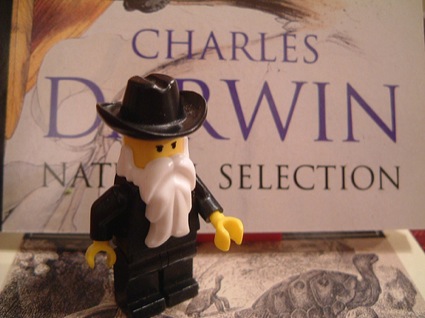It was Charle’s Darwin’s 200th birthday recently. There were special events on campus, posters everywhere, etc. I encoded some video lectures about him at work to post on the web. Despite the fact that Darwin’s work was certainly interesting and can be helpful in explaining SOME things, I’m afraid the bulk of it is psuedo-science, his intellectual descendants now often engaged in conjecture of the silliest sort.
Owen Barfield, in exploring epistemology (the philosophy of knowledge), had this to say about Darwin:
There is no more striking example than the Darwinian theory of that borrowing from the experimental by the non-experimental sciences, to which I referred at the beginning of this chapter. It was found that the appearances on earth so much lack the regularity of the appearances in the sky that no systematic hypotheses will fit them. But astronomy and physics had taught me that the business of science is to find hypotheses to save the appearances. By a hypotheses, then, these earthly appearances must be saved; and saved they were by the hypotheses of – chance variation. Now the concept of chance is precisely what a hypotheses is devised to save us from. Chance, in fact, = no hypothesis. Yet so hypnotic, at this moment in history, was the influence of the idols and of the special mode of thought which had begotten them, that only a few – and their voices soon died away – were troubled by the fact that the impressive vocabulary of technological investigation was actually being used to denote its breakdown; as though, because it is something we can do with ourselves in the water, drowning should be included as one of the different ways of swimming.
-Owen Barfield, Saving the Appearances, (1957), (Owen Barfield Reader p.156)
You get that? I had to read it twice.

“Saving the Appearances” means to explain why something is one way, despite appearing to be another. Like explaining that the Sun does not circle the earth (despite the appearance that it does), or explaining that your sister isn’t ugly (despite the appearance that she is rather fat). In this case, it’s explaining that all life is derived from chance, despite the appearance that it is designed.
Barfield contends that Darwin was borrowing scientific ideas from astronomers, who (as far as I can tell), lacking the ability to really test much of what they saw, had to come up with hypothesis so as to save face, that is, not to look stupid.
Actually, Barfield’s commentary in this case is so good, I’m probably just digging myself in a hole by trying to talk about it. I’ll stop that now!
